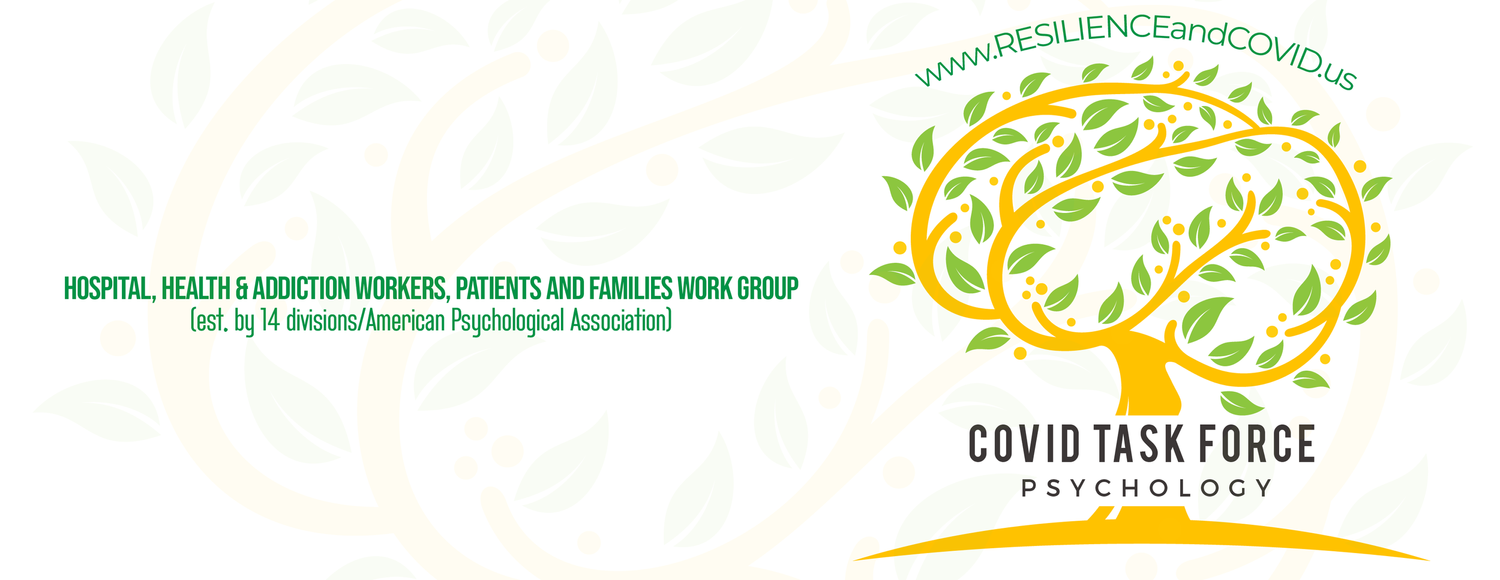What to Say When There Are No Words
By Elizabeth Malkin, MA, MSCP, and Robert M. Gordon, Psy.D. - Mental health professionals are confronting challenges in their clinical practice stemming from unprocessed grief and loss for themselves and their clients associated with COVID-19. These challenges are further compounded by heightened polarization and ongoing wars in Ukraine and Israel/Gaza that have eroded a sense of safety and security worldwide.
The Impact of Unprocessed Grief and Loss During COVID-19
By Robert M. Gordon, Psy.D., and Elizabeth Malkin, MA, MSCP. - In the past 3 ½ years, we have experienced an incomprehensible level of unprocessed grief and loss over the number of people who have died due to COVID-19. Many individuals helplessly witnessed loved ones die alone in hospitals and nursing homes without the normal healing mourning rituals. Imagining the enormity of these losses is “like looking directly into the sun for too long; although the image persists, one must nonetheless turn away for protection” (Gensler et al., 2002, p. 96).
Healing Moral Injury in the Age of COVID-19
By Clint Hougen, Ph.D., Robert M. Gordon, Psy.D., and Carolyn M. Springer - Much has been written about the experience of moral distress among healthcare workers during the COVID-19 pandemic. While there has been considerable emphasis on frontline workers, including physicians, nurses, and hospital staff, it is also important to consider the mental healthcare workers, who found themselves at similar risk of moral distress or injury.
How Everyone Was Transformed by the Pandemic
By Evelyn Rappoport, Psy.D. & Robert M. Gordon, Psy.D. - The long-term impact of COVID is beginning to be recognized and identified. The pandemic was a sudden, unexpected, and existentially shattering experience for many individuals, resulting in worldwide questioning of our sense of safety, certainty, and security (Hoffman, 2021).
Why You Need to Go on a News Diet
By Patricia A. O’Gorman, PhD - In my practice, I’m witnessing how stressed my patients are due to the news. My purpose in writing this post is to have you consider if this applies to you.
Communicating and Feeling Understood: Long-COVID Experience
By Robert M. Gordon, Psy.D., Joanna B. Wolfson, Ph.D., & Felicia B. Connor, Psy.D., ABPP-RP - Long COVID and associated conditions (LCAC) is characterized by the persistence of cognitive, physical, and psychological symptoms beyond three months from the onset of the SARS-COV-2 infection.
Navigating the Fog of Long COVID
By William Tsang, PsyD, Robert M. Gordon, PsyD, and Elina Talis, PsyD - Long COVID and associated conditions (LCAC) can affect many systems in the body. It is characterized by the persistence of symptoms including exhausting fatigue, neurocognitive difficulties such as mental fog, chest and muscle pain, and weakness, as well as anxiety and depression lasting beyond three months from the onset of the SARS-CoV-2 infection, and cannot be explained by an alternative diagnosis (Peter, et al., 2022; De Luca et al., 2022).
Are Active Shooter Drills Traumatizing Your Child?
By: Patricia A. O’Gorman, PhD - Research is finding that it is not just COVID-19 and school lockdowns that are leading to increased anxiety and self-medicating in youth, but active shooter drills are also prime contributors.
Addiction and COVID: A Toxic Cocktail
By Patricia A. O’Gorman, Ph.D. and Charles W. Morgan, M.D., DFASAM, FAAFP - With COVID-19 cases ticking up again, we need to refocus on the risk factors for contracting this disease, this time considering how the rapid increase in substance use, particularly alcohol and cannabis, is now a major contributor.
Compassionate Leadership During COVID-19
By Felicia B. Connor, Psy.D. (ABPP-RP) and Robert M. Gordon, PsyD - COVID-19 has caused unprecedented challenges for leaders across all industries during the past two years. Our prolonged experience of uncertainty, unpredictability, and threat has led to physical and psychological exhaustion, which we might feel for years to come.
Cultivating Forgiveness During COVID-19
By Robert M. Gordon, PsyD and Taylor Groth, PhD - As the COVID-19 pandemic shifts into an endemic, individuals are experiencing prolonged feelings of uncertainty, unprocessed grief, and loss, and a high degree of emotional and physical exhaustion.
Compassion: The Needed Ingredient for Family Gatherings
By Patricia A. O’Gorman - Families can be thorny even in good times. There’s always a great deal to negotiate. But this year, having an extra dose of compassion can help you know when to pass the potatoes and when to hold the mask, a theme I explored on a recent radio show for KCRW in Los Angeles.
Vaccine Hesitancy: Understanding the Power of "No"
By Patricia A. O’Gorman - The subject of vaccine hesitancy is personal for me. I currently live in a rural section of New York state that has the highest positive rate for COVID-19 in the state. I, like many of you, am concerned.
The Psychology Behind COVID-19 Vaccine Hesitancy
By By Klarissa Garcia, PsyD and Robert M. Gordon, PsyD
Vaccines save lives. However, a sizeable percentage of the population is reluctant to get the COVID-19 vaccine.
Vaccine hesitancy is a major public health crisis, with complex psychological underpinnings. It is not unique to COVID-19. In fact, the World Health Organization (2019) named vaccine hesitancy as one of the ten threats to global health even before this pandemic.
When Working with Cancer Patients Is Traumatic
by Soffía Pálsdóttir, Psy.D. - The backbone of a physician is resiliency. Although resiliency can help one rebound from adversity, it does not provide immunity from emotional and psychological distress. Physicians experience high rates of burnout, compassion fatigue, depression, and anxiety (McFarland et al., 2019). Tragically, physicians also have among the highest rates of suicide of any profession, with approximately one physician committing suicide every day (Petersen et al., 2016).
How to Improve Communication with Your Partner
by Gabriela Nordeman Sumarriva, MA, and Robert M. Gordon, Psy.D.,
Improving communication with your partner can be challenging—especially during times of turmoil, like the post-pandemic transition. These strategies can help you deal with uncertainty together.
The Return to School: Tips for Parents of Anxious Children
by Dr. Allison Winik
Is your child nervous about returning to school? Follow these steps to support them as they adjust back to in-person learning this fall.
Vaccine Etiquette: Tips to Have Civil Conversations
by Denise Carballea, M.S., and Rita M. Rivera, M.S.
Conversations regarding COVID-19 vaccines can be challenging. Here are some tips to have productive discussions and reduce conflicts.
Digital Hygiene During COVID-19
by Rita M. Rivera, M.S., and Denise Carballea, M.S.
Excessive screen time during the coronavirus pandemic may pose threats to our mental and physical health. These tips can help you take control of the time you spend online.
How to Build Resilience During the Post-Pandemic Transition
By Robert M. Gordon, PsyD and Jed N. McGiffin, PhD - The pandemic transition phase presents unique psychological challenges. Taking steps to increase flexibility and resilience may help us navigate them.




















